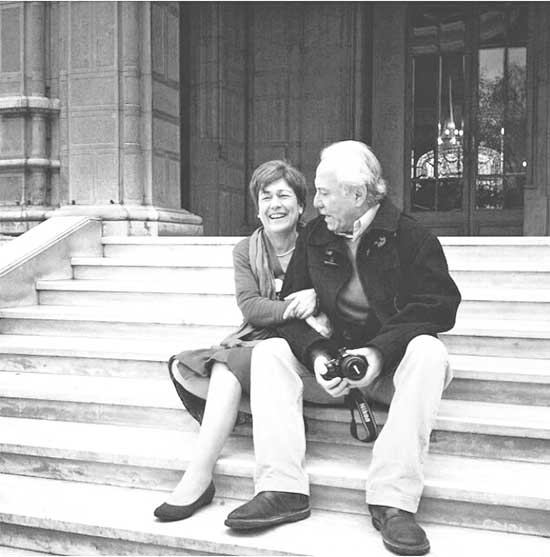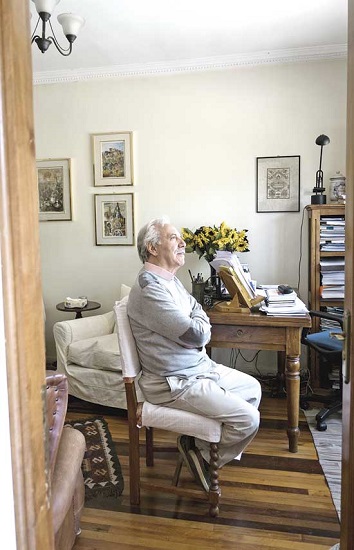Navidad, me repito del 2006
JUEVES, DICIEMBRE 21, 2006
La alegría de la Pascua
Todos los sentimientos, todas las palabras, todos los raciocinios se dan cita en la Nochebuena.
De vez en cuando, un comentario sobre cuestiones de actualidad de Chile, América y el mundo, por Cristóbal Orrego Sánchez, Profesor de Derecho en la Universidad Católica de Chile.
Posted by
Cristóbal Orrego
at
6:33 p.m.
0
comments
![]()
Es una lucha por formar a los niños desde pequeños para que no vayan a pensar como sus abuelos en tantas cosas que se arrastran desde hace 2000 años o más.
Progreso.
Leed.
Experta afirma los niños deben aprender a reconocer los prejuicios, a enfrentarlos y desarmarlos
Martes, 09 de Diciembre de 2014 00:00
Ana María Rodino fue invitada por la UC para reflexionar sobre la Educación en Derechos Humanos en América Latina.Existen varios niveles donde la educación puede aportar en el fortalecimiento de los Derechos Humanos. En primer lugar, están los valores y actitudes que ayudan a promover la vida, la libertad, la tolerancia, el respeto y la paz. Un segundo nivel tiene que ver con el desarrollo de destrezas, capacidades y competencias para la acción. Finalmente, en tercer lugar, el contexto del sistema escolar permite problematizar la información y la realidad en el nivel del aula.
El encuentro con Ana María Rodino fue organizado por el CEPPE UC; el Núcleo de Estudios en Educación en Derechos Humanos UC, y el Instituto Nacional de Derechos Humanos.
“A los niños se les debe enseñar a negociar y manejar situaciones de conflicto, a reconocer los prejuicios y desarrollar estructuras que permitan desarmarlos y enfrentarlos”, reflexionó al respecto Ana María Rodino.
La investigadora, asesora internacional y autora de importantes textos en el campo de la Educación en Derechos Humanos (DDHH) en Latinoamérica, fue invitada a exponer sobre este tema en la UC. Organizado por el Centro de Estudios de Políticas y Prácticas en Educación, CEPPE UC; el Núcleo de Estudios en Educación en Derechos Humanos, NEEDH UC, y el Instituto Nacional de Derechos Humanos, el encuentro se realizó el pasado jueves 13 de noviembre en la Facultad de Educación.
Rodino precisó que los prejuicios devienen en estereotipos, y los estereotipos conducen a la discriminación. “Hay que hacer un gran trabajo de desmontaje con estas estructuras, ya que los prejuicios empiezan con ideas muy leves, que parecen casi inofensivas. Luego se alimentan los estereotipos y los colectivos humanos terminan discriminando a ‘los otros’, que son mejores o peores que nosotros”, sostuvo.
Como dinámicas dentro de la sala de clases, la investigadora recomendó cultivar la empatía y tratar de que los niños conozcan y se vinculen con personas distintas. “Los derechos humanos no sólo se refieren a personas vulnerables. No sólo se discrimina la discapacidad o los migrantes, también se discriminan otras opciones de sexualidad, la diversidad etaria incluso. Por lo tanto, todos requerimos educación para los derechos humanos”, enfatizó.
Por último, sobre el rol de la escuela, Ana María Rodino señaló que la historia provee una mirada indispensable en este tema. “La memoria tiene que estar presente en la escuela y en el currículo escolar. La escuela tiene que poner estos temas en la mesa, problematizar la realidad y difundir datos y hechos objetivos de lo que en realidad ha sucedido en la historia de nuestro continente, en la historia de los pueblos”, sentenció.
La experta declaró que es cierto que el responsable en última instancia de las violaciones a los DDHH es el Estado, al no proveer la reglamentación, el marco y los sistemas de protección nacionales para evitar que sucedan violaciones o abusos de este grupo de derechos de la dignidad humana. “Pero finalmente somos todos responsables, de que los podamos ejercer, que los defendamos ante los demás, que comprendamos la relación que tienen con la ciudadanía y la democracia”, declaró.
En el conversatorio, que fue coordinado por las profesoras Lorena Medina y Marisa Meza, que lideran el NEEDH UC, participaron también los académicos e investigadores Dino Pancani, de la Facultad de Educación de la Universidad Alberto Hurtado, y Claudia Matus, de la Facultad de Educación UC. Matus es también directora del proyecto Anillo interdisciplinario de investigación Normalidad, Diferencia y Educación.
El conversatorio con Rodino formó parte de las primeras actividades del Núcleo de Investigación en Educación en Derechos Humanos que trabajará en conjunto con el Instituto Nacional de Derechos Humanos de Chile (INDH).
INFORMACIÓN PERIODÍSTICA
Francisco Zabaleta, fzabaleta@uc.cl
Posted by
Cristóbal Orrego
at
4:10 p.m.
0
comments
![]()
Ahora desde Inglaterra nos explican cómo el lobby gay ha intentado suprimir las libertades públicas en casi todas partes. Con algo de éxito para intimidar.
Leed, en The Spectator.
Gay marriage and the death of freedom
Rather than striking a blow for individual liberties, the dogma of gay marriage is stifling themHas there ever been a sweeter-sounding, more goosebump-inducing phrase than ‘Freedom to marry’? Everyone likes freedom (even illiberal politicians pay lip service to liberty), and who doesn’t love a good wedding? Marry these two things together (pun intended) and you end up with an endorphin-releasing buzzphrase that will make anyone grin wildly.So it has been following Senator David Leyonhjelm’s unveiling of the Freedom to Marry Bill. Across Oz, right-minded people who think gays must be allowed to get hitched experienced paroxysms of joy at the introduction of this new phrase into the political vernacular. Sure, those of a leftish bent had trouble computing the fact that it’s a classical liberal politician who’s championing their most beloved cause. But the instant they made peace with this seeming anomaly, they, together with small-l liberals, gay-rights activists and the Age-reading patrons of non-chain coffee shops across the land (well, in Melbourne), were giving themselves adrenalin rushes by whispering those three magic words: ‘Freedom to marry…’I hate to rain on this fabulous parade, but there’s a massive problem with this happy-clappy rallying cry. And it’s this: everywhere gay marriage has been introduced it has battered freedom, not boosted it. Debate has been chilled, dissenters harried, critics tear-gassed. Love and marriage might go together like horse and carriage, but freedom and gay marriage certainly do not. The double-thinking ‘freedom to marry’ has done more to power the elbow of the state than it has to expand the liberty of men and women. There are awkward questions the ‘freedom to marry’ folks just can’t answer. Like: if gay marriage is a liberal cause, how come it’s been attended by authoritarianism wherever it’s been introduced?Consider France. Hundreds of thousands of French people — or ‘bigots’, as the gay-marriage lobby brands anyone who disagrees with it — marched against the legalisation of gay marriage in 2013. And they were beaten and tear-gassed by riot cops. Parisians in t-shirts celebrating traditional marriage were arrested for holding ‘unauthorised protests’. In the words of Parisian writer John Laughland, critics of gay marriage were turned into ‘ideological enemies’ of the French state. It’s a funny expansion of freedom that so violently pummels the right to protest.Consider America. The authorities there haven’t had to whip out their truncheons because non-state mobs have policed the opponents of gay marriage on their behalf. In the words of the author Damon Linker, asupporter of gay marriage, Americans who raise even a peep of criticism of gay marriage face ‘ostracism from public life’. We saw this with the medieval hounding of Brendan Eich out of his job at Mozilla after it was revealed that — oh, the humanity! — he isn’t a massive fan of gays getting married. Linker says the gay-marriage brigade has created a menacing climate, where the aim seems to be to ‘stamp out rival visions’. Americans who fail to bow at the altar of same-sex hitching, from wedding photographers to cake-makers, are harassed and boycotted and sometimes put out of business. The ‘freedom to marry’ clearly trumps the freedom of conscience.Consider Britain. One of the first things gay campaigners here did when they won the right to marry was demand Catholic schools be forced to teach that gay marriage is as good as straight; even though they don’t believe this. Screw you, freedom of religion. Perhaps Catholic schools should bring back ‘priest holes’ to discuss their beliefs free from the watchful stare of the gay-marriage lobby, which, in Linker’s words, demands ‘psychological acceptance’ of gay marriage from all.Why is this alleged freedom so feverishly embraced by politicians who can’t spell the word freedom? There’s David Cameron, demolisher of press freedom; French officials, so allergic to liberty that they won’t let Muslim women wear what they want; Obama, Christendom’s spymaster-in-general. What draws such freedom-fearing rulers to the ‘freedom to marry’? It’s simple: gay marriage has diddly-squat to do with freedom. Rather, this new institution, invented from pure cloth by tiny numbers of sharp-suited lawyers and agitators, is better seen as a Trojan horse for the enforcement of a new morality, one which calls into question the old virtues of lifelong commitment and familial sovereignty and replaces them with the flightiness and flexibility more commonly associated with gay relationships. ‘Gay marriage’ is the lick of paint modern society gives to its own discomfort with the traditional family set-up and its desire to dismantle, or at least dent, that set-up in favour of pushing new, post-traditional, state-defined hook-ups.Twenty-five years ago, American thinker Christopher Lasch argued that ‘progressive rhetoric has the effect of concealing social crisis and moral breakdown by presenting them as the birth pangs of a new order’. Bingo! There’s no better description of gay marriage. Here, too, progressive-sounding rhetoric is really the dolling-up of our atomised, risk-averse societies’ growing disdain for those deep relationships in which families and communities traditionally socialised the next generation, mostly away from the prying eyes of the state. This is why the gay-marriage campaign is so contradictorily illiberal, so hostile to dissent, and so attractive to petty-authoritarian politicians: because it isn’t about expanding liberty at all; it’s about unilaterally overhauling the moral outlook of the traditionalist sections of society and elevating the commitment-phobic, passion-lite, short-termist values of the chattering classes instead. Aussie campaigners for the ‘Freedom to marry’ are actually lucky that the PM isn’t cheering their moral crusade. Because this means that when they finally win this illiberal liberty — which they unquestionably will — they’ll be able to present it as a great victory for civil libertarians who bravely took on The Man. When in truth, their victory will be built on the spilt blood of French protesters and the trampled-upon right to dissent of Americans and Britons and the transformation of gay marriage by Western political elites into a new orthodoxy that you question at your peril.Poor Mr Leyonhjelm — he thinks he’s striking a blow for liberty, when really he’s completing the final act in a pink-tinged tyranny kickstarted by the new authoritarians of the modern West.This article first appeared in the print edition of The Spectator magazine, dated 6 December 2014 Aus
Posted by
Cristóbal Orrego
at
8:44 p.m.
0
comments
![]()
The Clinic nos aporta interesante entrevista que desnuda la realidad de la voluntad de poder, por mucho que se revista de una mística laica y de una épica pseudodemocrática.
Atención: yo no suscribo los juicios negativos sobre la alcaldesa, quien merece todo mi respeto. Les pido que se fijen en la descripción de los acontecimientos y en el proceso de desenmascaramiento.
Leed.
Juan Eduardo Donoso, ex jefe de campaña y de gabinete de la alcaldesa de Providencia: “El poder desquició a Josefa Errázuriz”


Posted by
Cristóbal Orrego
at
8:54 p.m.
0
comments
![]()